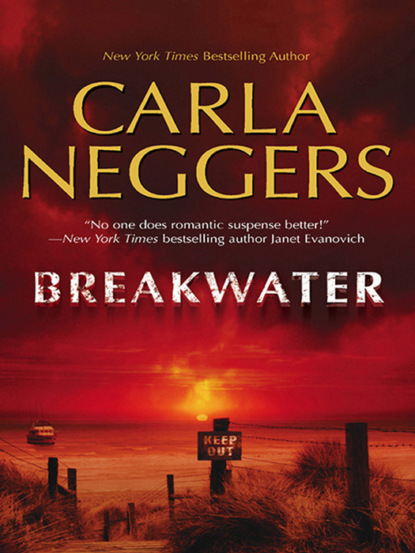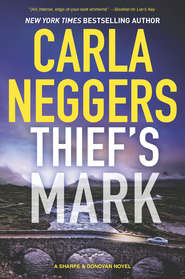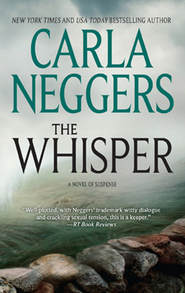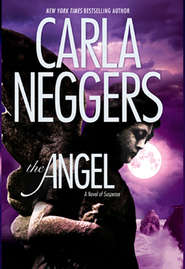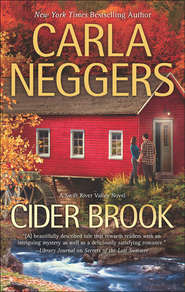По всем вопросам обращайтесь на: info@litportal.ru
(©) 2003-2024.
✖
Breakwater
Автор
Год написания книги
2018
Настройки чтения
Размер шрифта
Высота строк
Поля
They were right, of course, which he found only marginally comforting. If he was going to be blackmailed by Nazi goons, he wanted them to be smart Nazi goons, ones who wouldn’t get caught and expose him. He would do their bidding and hope they went away once they’d run out of dirty work for him.
When he’d spotted Quinn Harlowe, he had experienced a moment of panic. Quinn was a historian, not an attorney, but the Harlowes were notorious for noticing every damn thing. Probing, questioning, launching headfirst into danger. Quinn said she wasn’t like her forebears, but that was denial. Hadn’t she quit a secure job and gone out on her own at thirty-two? Wouldn’t it occur to her that she might need a few more years of salaried work under her belt, that she might just screw up and lose her shirt.
As far as Steve was concerned, courageous people made cowards like him look bad, and often got them in trouble.
He had to admit the situation he was in right now was his own fault. He’d been stupid and weak.
Fortunately, the car’s tinted windows prevented Quinn or anyone from seeing into the back seat, and the Nazis, experts in defensive driving, had moved fast.
But Steve knew he’d die with the image burned into his brain of Alicia’s look of relief turning to horror when she saw the two men in the front seat and realized he’d betrayed her.
The sedan stopped just long enough for him to hit the pavement, then pulled back onto Pennsylvania Avenue, becoming just another Lincoln Town Car on D.C.’s jam-packed streets, Washington’s notorious traffic even worse during cherry-blossom season. The annual two weeks of insanity would be over soon. With any luck, Steve thought, so would his month of nightmares.
He adjusted his suit coat and tie and took out a folded handkerchief, mopping his brow. Nothing he could do about his saturated shirt. He’d been sweating like a pig since the call to come meet these guys. Fortunately, he hadn’t had time to eat. Otherwise he’d have barfed up his lunch by now.
He slowed his pace as he approached the imposing neoclassical headquarters of the United States Department of Justice, a massive building that occupied the entire block between Pennsylvania Avenue and Constitution Avenue. His excitement at finding out he’d be working under Deputy Assistant Attorney General Gerard Lattimore himself had faded in his two months on the job. Now he had not only betrayed Alicia, his only real friend at DOJ, but also the hundreds of superb, honorable DOJ employees who’d be tarnished by what he’d done.
But he was an aberration. Duplicitous, reprehensible. Scum. He’d known what he was doing, both with the congressman’s underage daughter and with Alicia. The kind of risks he took were never for anything noble or remotely worthy. With the congressman’s daughter—sexual gratification. With Alicia—saving his own skin. At least with his sexual escapades he could rationalize his behavior by deluding himself into believing he was the only one who got hurt.
But after seeing Alicia stuffed in the back seat of the Nazis’ car, whimpering and twitching, he no longer could deceive himself.
The goons can’t have any reason to want her dead.
Steve arrived at his cubicle. Who the hell was he kidding? These bastards were true believers. He had no doubt they’d kill anyone who got in their way. Alicia. Him. He didn’t know how Alicia had run afoul of them—he didn’t want to know. But, clearly she had.
A message from Quinn Harlowe was on his voice mail. His heart pounded as he listened to her tight, controlled voice, asking him to call her as soon as possible.
He checked his cell phone. She’d left a message there, too. He used it to return her call.
She picked up on the first ring. “Steve, thanks for getting back to me. I know you and Alicia have become friends—have you seen her this afternoon by any chance?”
“I haven’t seen her at all today. As far as I know, she didn’t come in to work. I thought she was still at your cottage. What’s going on?”
“I saw her about a half hour ago. I was having coffee down the street from my office, and she stopped by. She was upset about something and wanted to talk to me about it, but she ran off before I could find out what was wrong.”
“Why did she run off?”
“The owner of the coffee shop misread the situation and threatened to call the police.”
Steve felt a fresh rush of sweat on his brow. The police. “He didn’t go through with it?”
“No.”
Quinn wasn’t one to get ahead of herself, no matter her sense of urgency. And she was loyal to Alicia. Their friendship might be strained, even on its last legs, but Quinn would never reveal compromising details regarding Alicia’s condition without more to go on.
“Alicia hasn’t been herself for the past few weeks,” Steve said. “She’s burned out. Everyone says it hasn’t been the same around here since you left—not that it’s your fault she’s on edge. What do you want me to do?”
“I’ll stop by her apartment and see if she’s there. I don’t want to make matters worse. She took off before I could get much of anything out of her, at least anything that made any sense.”
Good, Steve thought. Quinn was dismissing or at least couldn’t put together whatever Alicia had told her. He cleared his throat, wishing he could get the squeak out of his voice. “I’m sorry she was that upset.”
“Me, too. If she shows up there, or if she calls, will you let me know?”
“Absolutely.” His wet shirt felt cold now. “If there’s anything else I can do, call me. I’m just here toiling in the trenches.”
He didn’t get even a chuckle out of Quinn. She thanked him, promised to be in touch if there was news and hung up.
Steve slumped in his chair and blinked back tears. Hell. What a scumbag he was. He had met Quinn a few times at get-togethers after work with his colleagues, her former colleagues. She had a sense of humor and although she was very good at what she did, she wasn’t calculating and superambitious, common ailments among Washington types.
Wherever the Nazis were taking Alicia—whatever her transgressions were—he wished he could believe she’d be okay.
It’s out of my hands.
His calendar alert dinged. Five minutes until his afternoon meeting. Steve couldn’t even remember what it was about. Would Lattimore be there?
Swearing to himself, he opened up a bottle of water and drank it down without once coming up for air. He felt better, and got back to work on behalf of the American people.
3
Something was wrong.
Huck McCabe paused to do a few leg stretches, a couple miles into his midafternoon run. He’d come to the end of a narrow road, a short spoke off the loop road that encircled the small Chesapeake Bay village of Yorkville, Virginia. In his forty-eight hours there, Huck had discovered that getting around the picturesque village didn’t take impressive navigational skills. It had a main street lined with cute shops and an old-fashioned diner. It had the waterfront with lots of modest cottages. It had a couple of marinas and a smattering of restaurants that each served its own private family recipe for crab cakes, and it had three bait-and-tackle shops that offered up everything a fisherman could possibly need for anything from a weekend to a lifetime on the Chesapeake.
There were no giant trophy houses in Yorkville. Most of the houses—year-round or second home—were built in the 1940s and 1950s. If he ran the town for a day, Huck would outlaw chain-link fences. It seemed every house had one, and he thought they were damn ugly, the only real blot on the otherwise quaint town.
The cottage where Alicia Miller had spent the weekend was the second of two small, older cottages on the dead-end road. It had no fence. Its ground-level front porch was low enough not to need a balustrade, allowing an unimpeded view of the water from its clean white wicker chairs.
Huck had noticed there was no car in the short dirt driveway. Nor was there any sign of life inside, although he hadn’t gone so far as to knock on the front or side doors or peek in the windows.
He finished his stretches. He could have skipped them, but they gave him an excuse to check out the area. The road dead-ended at a salt marsh. On the other side of the marsh, about three-quarters of a mile farther up the bay, was Breakwater, known locally as the Crawford compound, the hundred-acre waterfront estate owned by wealthy Washington entrepreneur Oliver Crawford. Crawford had made his fortune in real estate and bought Breakwater five years ago. Most locals expected him to renovate the pre-Civil War house and retire there.
They were wrong. Crawford changed his plans for his bayside property after he was kidnapped off his boat in the Caribbean last December. His own security people rescued him after fifteen days of captivity. He was kept under grueling conditions and constant fear of a bullet in the head. His kidnappers got away. Traumatized, determined to help other businessmen avoid such horrors, Crawford decided to start his own elite private security company. Never mind that he knew little to nothing about the private security industry. He set about converting his bayside country estate into Breakwater Security, bringing in the people and equipment he needed, building the right facilities, sparing no expense.
Huck was a new Breakwater Security hire.
Ostensibly.
As he looked out at the water, he decided he could do worse than Virginia in springtime. He noticed that some kind of bird had built a giant mess of a nest on a buoy out at the mouth of the small cove. An osprey nest, he thought. The Northern Neck, a tidewater peninsula tucked between the Potomac and the Rappahannock Rivers, was on the Atlantic Flyway, making it popular with bird-watchers.
A Californian, Huck was getting used to the lay of the gentle land with its rolling hills, creeks, marshes, nature preserves, historic sites and small towns. Washington and Lee country. Life was slower here. He could picture George Washington and Robert E. Lee as little boys, fishing the same rivers, praying in the same churches that were still scattered across the landscape.
Or not—Huck didn’t know what Washington and Lee did as boys or if the places he’d seen on his way to Yorkville had existed in their day. History had never been his long suit.
He was better at catching fugitives.
It was, after all, a fugitive who had inadvertently led him to the Northern Neck in the first place.
But he shut off that line of thinking, as if it might betray him, and jogged back down to the loop road, passing the second cottage, a sister to the one where Alicia Miller had stayed. He kept his pace slow, following the wider, but still quiet, road along the water, feeling the humidity building in the midafternoon air.





